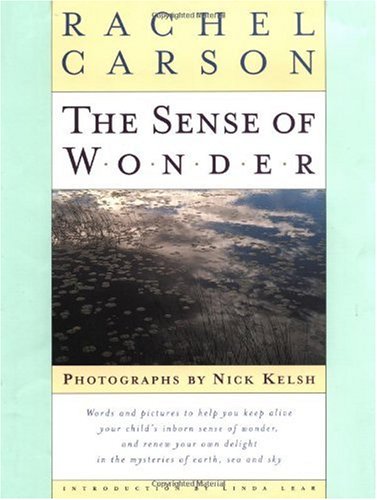Teaching Children Wonder Does Not Require a Scientific Background
A child's world is fresh and new and beautiful, full of wonder and excitement. It is our misfortune that for most of us that clear-eyed vision, that true instinct for what is beautiful and awe-inspiring, is dimmed and even lost before we reach adulthood. If I had influence with the good fairy who is supposed to preside over the christening of all children I should ask that her gift to each child in the world be a sense of wonder so indestructible that it would last throughout life, as an unfailing antidote against the boredom and disenchantments of later years, the sterile preoccupation with things that are artificial, the alienation form the sources of our strength.
If a child is to keep alive his inborn sense of wonder without any such gift from the fairies, he needs the companionship of at least one adult who can share it, rediscovering with him the joy, excitement and mystery of the world we live in. Parents often have a sense of inadequacy when confronted on the one hand with the eager, sensitive mind of a child and on the other with a world of complex physical nature, inhabited by a life so various and unfamiliar that it seems hopeless to reduce it to order and knowledge. In a mood of self-defeat, they exclaim, "How can I possibly teach my child about nature--why, I don't even know one bird from another!"
I sincerely believe that for the child, and for the parent seeking to guide him, it is not half so important to know as to feel. If facts are seeds taht later produce knowledge and wisdom, then the emotions and the impressions of the senses are the fertile soil in which the seeds must grow. The years of early childhood are the time to prepare soil. Once the emotions have been aroused--a sense of the beautiful, the excitement of the new and the unknown, a feeling of sympathy, pity, admiration or love--then we wish for knowledge about the object of our emotional response. Once found, it has lasting meaning. It is more important to pave the way for the child to want to know than to put him on a diet of facts he is not ready to assimilate.
If you are a parent who feels he has little nature lore at his disposal there is still much you can do for your child. With him, wherever you are and whatever your resources, you can still look up at the sky--its dawn and twilight beauties, its moving clouds, its stars by night. You can listen to the wind, whether it blows with majestic voice through a forest or sings a many-voiced chorus around the eaves of your house or the corners of your apartment building, and in the listening, you can gain magical release for your thoughts. You can still feel the rain on your face and think of its long journey, its many transmutations, from sea to air to earth. Even if you are a city dweller, you can find some place, perhaps a park or a golf course, where you can observe the mysterious migrations of the birds and the changing seasons. And with your child you can ponder the myster of a growing seed, even if it be only one planted in a pot of earth in the kitchen window.
Notes:
Just appreciating the wind, or admiring nature in without explanation is enough to instill a sense of wonder.
Folksonomies: education wonder children naturalism
Taxonomies:
/religion and spirituality (0.566953)
/hobbies and interests/magic and illusion (0.551543)
/science/weather (0.535062)
Keywords:
complex physical nature (0.975063 (neutral:0.000000)), little nature lore (0.942932 (neutral:0.000000)), child (0.923910 (positive:0.458502)), sense (0.868684 (positive:0.054911)), inborn sense (0.866572 (positive:0.399449)), unfailing antidote (0.842403 (positive:0.561492)), sterile preoccupation (0.833310 (negative:-0.204347)), Scientific Background (0.830327 (positive:0.399407)), wonder (0.825874 (positive:0.515578)), alienation form (0.820688 (positive:0.460384)), true instinct (0.818514 (positive:0.546143)), seeds taht (0.817242 (positive:0.506459)), clear-eyed vision (0.814772 (positive:0.568507)), good fairy (0.809075 (positive:0.524096)), sensitive mind (0.802034 (neutral:0.000000)), city dweller (0.799878 (neutral:0.000000)), fertile soil (0.799537 (positive:0.752115)), early childhood (0.793911 (positive:0.433184)), mysterious migrations (0.792907 (neutral:0.000000)), twilight beauties (0.792718 (positive:0.548930)), golf course (0.789169 (neutral:0.000000)), emotional response (0.787963 (positive:0.325831)), kitchen window (0.786507 (neutral:0.000000)), majestic voice (0.785819 (neutral:0.000000)), apartment building (0.783528 (neutral:0.000000)), long journey (0.781831 (negative:-0.461006)), magical release (0.780658 (positive:0.322768)), many-voiced chorus (0.778440 (neutral:0.000000)), excitement (0.766501 (positive:0.605242)), world (0.763073 (positive:0.694742))
Entities:
one hand:Quantity (0.010000 (neutral:0.000000))
Concepts:
Emotion (0.962040): dbpedia | freebase
Sense (0.542430): dbpedia | freebase
Childhood (0.516483): dbpedia | freebase
Feeling (0.486856): dbpedia | freebase
Perception (0.452155): dbpedia | freebase | opencyc
World (0.433449): dbpedia | ciaFactbook | freebase
Nature (0.426080): dbpedia | freebase | opencyc
English-language films (0.420165): dbpedia






